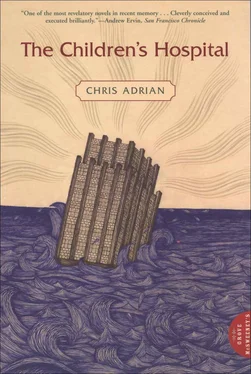Jemma was sure there was an answer to be had, it was just a matter of framing the question correctly. There was a reason he was sleeping, and she thought she might puzzle it out if she could just look at him in the right way, or look at him for long enough, or look at him in the right state of mind. She spent hours in his room — too many, Vivian told her, for a pregnant woman to spend in the room of a boy with a mystery illness, no matter that she wore a five-ply isolation suit and tempered-glass helmet, no matter that she didn’t breathe the same air as him. But she felt compelled to be close to him, and to study him with her usual and unusual senses. So she stood in his room, half sitting on a table, looking at him.
He lay in his special PICU bed — made more special in the past two weeks by three nurses who’d added accessories both decorative and functional: a set of projectors, one on either side of the rails beside his head, showed scenes of lost nature, shivering deciduous forests and blue mountains and stark desert dunes, on the ceiling above his face; a pair of shot-glass-sized speakers played the sort of music they thought he’d like; stuffed animals, bionic and plush, rode chains and motors to nuzzle his cheek or his ribs or roar over his head, set up by a nurse who had read someplace that children in comas benefited from this sort of stimulation. A judicious selection of gifts — balls and gloves and rubber dinosaurs brought by people who seemed not to understand what an ancient sort of fourteen he was — was arranged by the nurses on the tables that flanked his bed. Clear-plastic-drape walls — he could have just touched the ones at his sides if he reached his hands toward them — dropped down from the ceiling on three sides of the bed. Only his feet were covered by his sheet and blanket, white hospital finery of the new standard. Jemma ran her eyes back and forth over him, from the hidden shapes of his toes, over his strange Popeye legs, with their huge calves, knobby knees, and fat, hairy thighs, past the foley tube that ran into his diaper, up the trail of hair that came out of the diaper and petered out just past his belly button, marking a border of maturation — everywhere above it he was practically hairless, except on top of his head. She watched the quiet movement of his chest as he breathed, and the little tug between his clavicles that came every fourth or fifth breath. He cracked his pale lips to utter a wet sigh. She put out a finger toward him, meaning to touch his shoulder and send in a little fire to dry out his mouth and throat, but then did it the old fashioned way instead, picking up the Yankauer and suctioning his mouth and the back of his throat. His heart rate dipped — she felt it in her stomach and heard it in the deepening tones of the monitor — and then rose again. The tugging between his clavicles went away. He sighed again.
With the suction still in her hand she put a finger on him, right on his chin, so together they struck a thoughtful pose, and she concentrated on him more fully, imagining that she was suddenly made of cloud, drifting over him then settling over him. She was trying to touch his mind, to root around in his brain to see if anyone was home, to see if he was dreaming. It worked no better than usual. Instead of becoming more aware of him, she found herself repelled from the empty space he occupied but somehow did not take up, and for all that she was concentrating on him, she only became more aware of the people around him in the hospital. They were moving a little differently since he’d come on board, his presence a strange new mass that altered their orbits and routines in subtle ways. She imagined them pausing to consider him: Maggie staring out the window, away from her students, and seeing his body hanging in the sky; Dr. Tiller rocking in a chair in the old psych ward, halted in embroidering a headdress to wonder what his middle name might be; Ishmael stopping for a moment the push-ups he made more difficult by piling half his preschool class on his back to consider again how this boy made him feel finally not lonely anymore; Rob interrupting his own bath-time song with a gloomy feeling — overwhelmed with the certainty that this kid was really bad news; Vivian breaking away from her most obsessive study of the journal not to eat or sleep but to stare and stare into a mound of black cruise-ship ash. It must be her imagination, she knew, but the scenes looked real in her head, and she felt so sure that there was a new list to the hospital, that it no longer rode straight in the water but leaned a little because this boy was so heavy that it must acknowledge him in at least this way. Jemma took another stab at him, covering his whole face with her hand and seeking to understand him by setting him entirely on fire. It showed her everything but revealed nothing, and it made her feel threatened by him, this boy who would not become well. Just before she stopped she had a surge of worry for her baby, because she thought, for no good reason, that the boy was threatening him, too. She took away her hand and opened her eyes and sighed, turning away from the bed. Her whole class was lined up at the window, left to right, Josh to Valium, displayed in order of height. They all waved.

“Thanks for letting me speak,” said Vivian, guest-starring at one of Father Jane’s services. She had been acting strangely since they’d come back from the boat, and stranger still in the past few days. It was their one hundred and eighty-seventh day at sea. She’d become withdrawn and quiet and — strangest of all — had stopped dating. In all the years she’d known Vivian, Jemma had only seen her do that three times, and never for more than a week — when she had mono in college, after the world ended, and after Ishmael broke up with her. Now it had been two weeks. Jemma thought at first that Vivian had merely exhausted the supply of men in the hospital — six weeks earlier they’d had a conversation in which they’d debated the merits and perils of re-dating a person — but the shallowest poll of the population revealed that there were men available who’d hardly even talked to Vivian, let alone dated her. Then Jemma thought she was considering a change of orientation — there’d been clues, after all: a new, unattractive hairdo; the appearance in her wardrobe of two plaid shirts with the sleeves cut off at the shoulder; a new taste for heavy macramé jewelry that made her look like she was wearing plant holders around her neck. Arrested on the brink of lesbianism, she was considering the abyss, or else carefully scoping among the slim hospital pickings for prospects — all the obvious lesbians were already taken, even all the obviously incipient lesbians seemed to have found one another — and wondering if by the sheer enthusiasm of her new passion she might turn someone.
But it was just Jemma’s imagination that invested the looks of scorn Vivian habitually directed at Dr. Sundae with touches of longing, and when she finally asked her what was going on, she got an answer that only increased her confusion and her concern. “I don’t need it anymore,” Vivian said during Jemma’s twenty-seven-week checkup. Vivian was dipping Jemma’s urine, her back turned to her when she spoke. They were in the last exam room left in the ER.
“What does that mean?” Jemma asked, wondering suddenly if the angel was ministering to Vivian in ways that were nearly unimaginable, and a machine started to take shape in Jemma’s mind, a thing with multiple mechanical tongues and intricate penis wheels and long textured fingers.
“Just what it sounds like. I don’t need it.”
“Are you serious?”
“Look out the window, Jemma. Things have changed. Doesn’t it follow that we might change, too?”
Читать дальше













